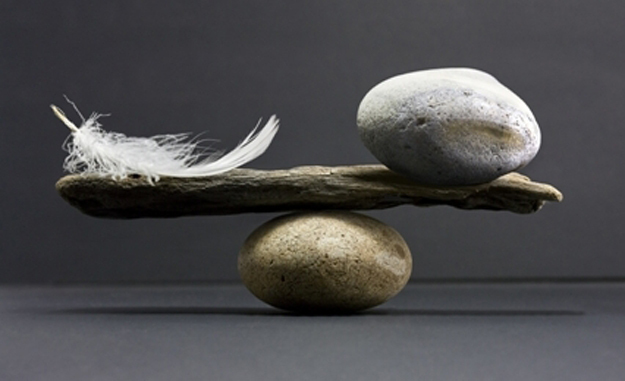Incase you didn’t know… Ityadi means etcetera in hindi.
Love. It’s such a powerful word. Literally! Just like war. Maybe that’s why they are often used together. Love can either make you powerful or steal you of all your power.
Have you observed a weighing balance? Well I have. As a child, when I’d walk into a store with my mother, I’d put my chin on the counter as they measured the food grains and other groceries on the weighing scale. A fat old man would usually be at the counter, counting his money; while a thin worker would be busy running around and fetching stuff dictated by my mother out of a list, and measuring it in front of us. He would put solid black metal blocks of weights like 500g, 1kg etc on one side, and a bag on the other and fill it with the grains.
Only for a brief moment would I see the scales in equilibrium, and then they would go back to being in opposite north-south directions.
People in love, are just like the scales. A couple resemble the balance in how they are almost always leaning towards opposing sides. This according to me, symbolises the almost ‘never equal’ distribution of power in all relationships.
The proof of it is all around you. Just think of any couple that come to your mind or take your own example (if you were or are in a relation). Most often we see the man calling the shots, making decisions in both financial and personal space. The woman, who seems meek in comparison to her partner, may not have been so before she fell in love. But, to allow one side of the balance reach higher, the other side has to slide down.
Also Read: 8 Kinds Of Anxieties Every Girl Faces But Doesn’t Say It!
This can be the other way around too, where women are on the powerful side. However, unlike women, who have to battle inequality outside the relationship as well, men compensate by feeling more assured outside the relationship (like at work or with friends) and thus are not much affected by the imbalance.
In a relationship, there is always someone who loves more and someone who loves less or expresses less. In my experience, the more you love & express, the lower you sink on that scale, allowing the lesser loving partner all the power to control, manipulate, and change you the way they want to.
The sad part of the power imbalance though is that the powerful person almost always attains a sense of entitlement and begins to ill treat the other, treating their significant other as a subservient rather than a partner.
The only way to avoid the death of such relationship is if the balance is constantly moving up and down more like a seesaw, where there is a healthy exchange of love and power.
“Power without love is reckless and abusive, and love without power is sentimental and anaemic.” -Martin Luther King Jr.
What is your opinion about love and power? Let us know…











2 comments
“I told you I hate politics!” she yelled, half through her words and half through her piercing stare. “This is not politics” he averted her gaze and instead chose to look in the general direction of the television screen that beamed streams of photons that would have added up to a meaningful narrative if only either of them were paying attention. “Don’t you get it? Everything is politics to you!” she continued to yell at him, hoping that this time, she’ll get lucky enough to see a hint of guilt on his face. She was tired of their mind games; tired of having to fight every time she wanted to be taken seriously; tired of always being the one to compromise just because he felt some misplaced sense of pride in leading an uncompromising life.
“No! You are the one who’s choosing to see every moment of our life through the lens of feminism. You’re the one bringing politics into love!” he yelled back, trying as hard as he can to be louder than her. He didn’t have to try too hard. He had always been the louder one between the two. In the beginning, being loud had seemed to work on her. It used to have the intended effect of making her re-evaluate if the topic of disagreement was indeed worth a heated shouting-match. But in the last few weeks, it appeared as if she had grown immune to his aggression. She had become… more combative. At least, that’s how he had described her evolution to his friends during their recent customary Friday night get-together.
“I don’t want to make this about feminism but it’s not my fault if you fit the stereotype of all the men who are threatened by a woman the moment she starts demanding to be treated as an equal. Think of all the major decisions we’ve taken in the last 2 years to make this relationship work. They have all been about me compromising to accommodate your demands. I changed my job, not you. I moved in with you even though my old house was bigger than yours. I cook food on most days, not you. You’ve never volunteered to wash the dishes when the maid goes on leave. I am the one who stays at my friend’s place whenever your parents visit, even though we pay equal rent. I even quit smoking for you. Do you know how hard it was? When have you ever felt like putting aside your wishes for mine? So, get this into your head – this is not about feminism. This is about me wanting to be treated as an equal in this relationship.”
This was not the first time Payal had made this argument. Going by how defensive his body language was, she knew this wouldn’t be the last time either. He wasn’t a bad person. She didn’t doubt his intentions or that he loved her… dearly. What she was fighting, was just a habit. A habit that was hammered in place through years of conditioning in a patriarchal world. The normal state of the relationship balance scale, the fair state, the equal state, was always tilted in his favour.
“I didn’t ask you to make any of those compromises. You chose to make those choices all by yourselves and now I know why! You were just piling up points so that you can guilt me into giving up control over my own life someday. I feel so suffocated. Why can’t you just let me be the way I want to be?” he spoke softly this time, almost as if he was making a desperate plea for help. He wanted to shout at her, he wanted to defend himself more aggressively but he knew that doing so would only escalate the fight. But in his mind, he reminded himself that he too had made sacrifices. He had stopped hanging out with friends whose jokes she found offensive. He had stopped talking to women in parties, especially if they seemed to be interested in him. He had born most of the cost for their recent trip to Sri Lanka since she didn’t have enough savings to join him at her own cost. He always watched the shows she wanted to watch on Netflix; always ordered the dishes she wanted in restaurants; always went to the movies she wanted to see… he could go on. But he knew what her response would be if he ever brought them up. She’d argue that his sacrifices were all about trivial everyday preferences while her sacrifices were somehow deeper and with long-term consequences. He had tried to convince her several times that they had both been making sacrifices for each other and that it was impossible to say who had compromised more. But after a few attempts, he had given up. Partly because he himself had stopped believing in those arguments. He knew that she had sacrificed more. But somehow, despite all the logical reasons against him, he intuitively felt that he was still in the right; that he was only following what was shown to him as the righteous path by everyone around him throughout his life. On rare occasions, he felt angry at all those people for having led him astray. But on all other occasions, he was angry at Payal for wanting to prove to him over and over again that he was in the wrong. Why can’t she just let me be?! he cried silently.
“Because I love you Nakul!” Payal replied affectionately. She was still angry. But she could also see that he was feeling cornered and hurt. Male ego is really the most fragile thing in the whole world! she thought to herself. “Then let me be” he replied as he looked up to meet her gaze for the first time since they started fighting. She cringed. He was still fighting. He was still trying to tip the scales to what he considered their true equilibrium position – him being more powerful than her. Nakul over Payal. Man over woman. Anything else was just a power struggle… bad politics.
“Okay, be!” she said and walked away silently to the living room. She knew she wouldn’t win this battle. But she also knew she had come too far to stop fighting the war. For the moment, she needed a break as badly as he did. She sat at the dining table and switched-on her laptop. It popped to life, revealing a battle of comments on her blog. A flurry of #NotAllMen hashtags stole her attention. Suddenly, she realized for the millionth time – unlike him, she didn’t have the luxury of taking a break from this fight. She could only switch the battlefield.
I don’t know who you are… But your story was powerful. Please contact me if you are reading this…